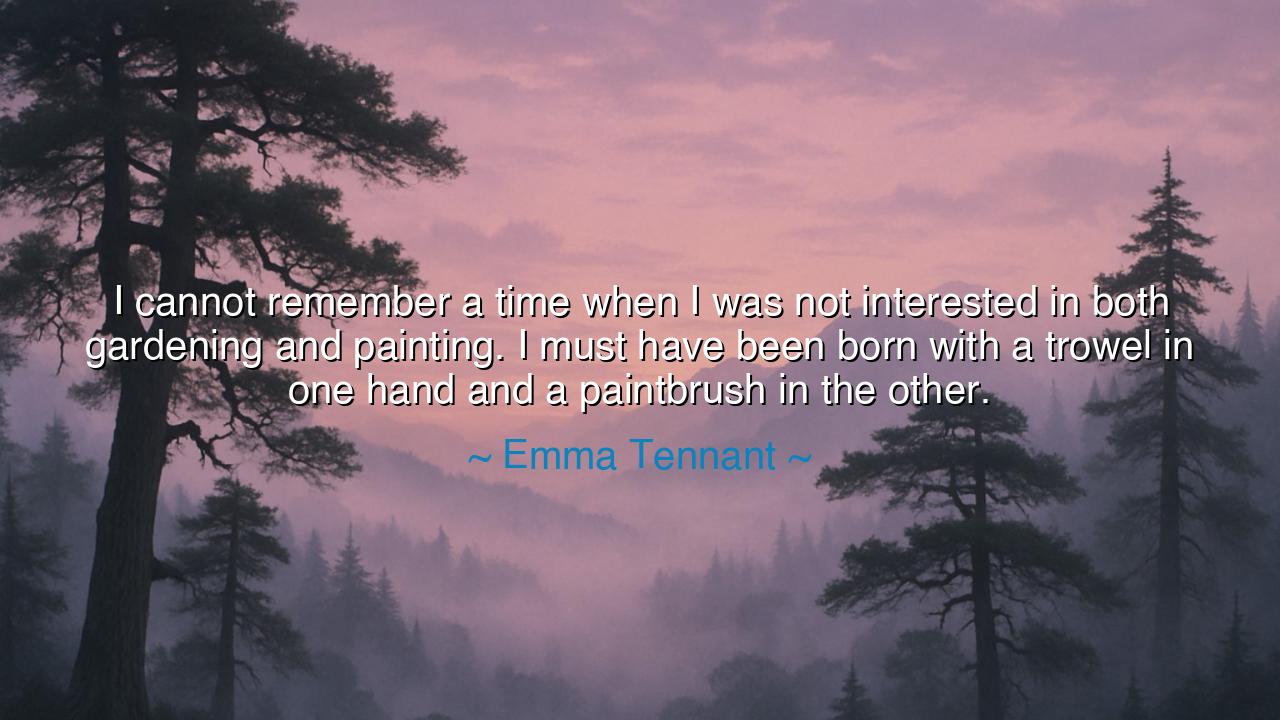
I cannot remember a time when I was not interested in both
I cannot remember a time when I was not interested in both gardening and painting. I must have been born with a trowel in one hand and a paintbrush in the other.






Listen, O children of wisdom, to the words of Emma Tennant, whose reflection on gardening and painting speaks to a deeper truth of creation and connection: "I cannot remember a time when I was not interested in both gardening and painting. I must have been born with a trowel in one hand and a paintbrush in the other." In these words, Tennant reveals the profound connection between the creative forces of the earth and the artistic spirit. Her assertion that she was born with a trowel and a paintbrush in hand is a beautiful metaphor for the idea that creation—whether through the soil or the canvas—is not merely a hobby or a talent but a calling, something inherent within her very soul, as though the earth itself imbued her with the desire to create.
In the ancient wisdom of the Greeks, the act of creation was seen as both sacred and divine. The gods, in their many forms, were both creators and protectors of the natural world, and the humans who engaged in creation—whether through art, sculpture, or farming—were viewed as participants in the divine order. Plato spoke of the act of creation as one that aligns the human soul with the divine, suggesting that art and nature are not separate but interwoven forms of expression. Tennant’s statement that she cannot recall a time when she was not drawn to gardening and painting reflects this ancient truth—that creation is an innate calling, one that flows from the divine rhythm of life. The act of gardening, like painting, is a way of shaping the world, of bringing something into existence that did not exist before.
The lesson here, O children, is one of creativity and innate purpose. Just as Tennant expresses her lifelong connection to both gardening and painting, we too must recognize that our callings are not accidental. The things that captivate our hearts and minds—whether they are in the realm of nature or the arts—are gifts given to us, shaping our lives and guiding our hands. Gardening, like painting, is not simply an activity to pass the time, but a sacred engagement with the world. Through gardening, we are invited to become co-creators with nature, tending to the earth as it nurtures us, while in painting, we channel our emotions and visions, allowing the world to see through our eyes. Both are sacred acts, grounded in the idea that creation is a means of connecting with something greater than ourselves.
Consider, O children, the example of the great artist and gardener, Claude Monet. Known for his breathtaking landscapes, Monet was not merely a painter but also an avid gardener. His gardens at Giverny became his living canvas, a place where nature and art merged. Monet’s works, inspired by the flowers and water lilies he tended to, reflected not only his vision of the world but also his deep connection to the earth. His gardening was not separate from his art, but an extension of it. Tennant’s words, too, evoke this idea—that gardening and painting are not independent endeavors but complementary expressions of the human soul, where one nurtures the spirit and the other captures the essence of what is nurtured.
In the ancient traditions of Egypt, the act of tending the earth was considered a spiritual duty. The god Osiris, who was the god of both the harvest and the afterlife, was often depicted as part of the natural cycles of life and death, and the ancient Egyptians believed that working the land was a way of honoring the divine. Gardening, like art, was seen as a form of respect for the earth’s gifts and a way to maintain the balance of life. Tennant’s lifelong passion for gardening and painting reflects this ancient understanding—that to create is to be in harmony with the world, and that the work of the hands is an extension of the soul’s deepest desires.
The lesson here, O children, is that creation is both a gift and a responsibility. Whether we engage in gardening, painting, or any other form of creative expression, we must honor the divine calling that stirs within us. Tennant’s lifelong love for these pursuits teaches us that passion is not merely something we choose but something we are born with, something that becomes part of our very being. To create is to become a part of the divine order, to shape the world in ways that reflect the beauty and purpose of life itself.
So, O children, embrace the creative gifts that lie within you. Whether your passion is for gardening, painting, or any other form of creation, know that these pursuits are sacred, and they hold the power to connect you to something greater. Engage deeply with your calling, for it is in these acts of creation that we find purpose, fulfillment, and a deeper connection to the world. Like Tennant, Monet, and countless others before us, we are all born with the desire to create, and in doing so, we contribute to the divine rhythm of the earth and the universe. Let your creative pursuits be a reflection of the beauty and purpose that live within you.






AAdministratorAdministrator
Welcome, honored guests. Please leave a comment, we will respond soon